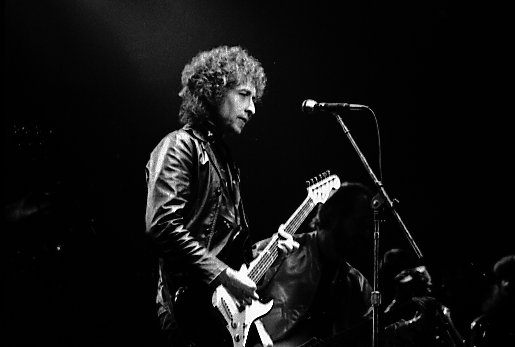Prizes and Plagiarism: Bob Dylan’s Recent Nobel Prize Speech is Called into Question
In October, 2016, Bob Dylan won the Nobel Prize in Literature. On June 4, 2017, Dylan gave a lecture to the Swedish Academy, fulfilling the requirements for receiving the $900,000 of prize money he won along with the Nobel.
In his lecture, Dylan discussed three famous books that are often taught in college literature classes: Moby-Dick, The Odyssey, and All Quiet on the Western Front. According to the article, “Bob Dylan Accused of Plagiarizing Portions of Nobel Prize Lecture,” from Variety, a journalist named Andrea Pitzer, who writes for an online magazine called Slate, uncovered several similarities between Dylan’s lecture and the entry for Moby-Dick on the website SparkNotes.
SparkNotes is a website that summarizes books, especially books often taught in literature classes. Moby-Dick is a book about a man named Ishmael who becomes a sailor on a nineteenth century whaling ship. The captain of the ship is Captain Ahab, who is obsessed with hunting a white whale named Moby-Dick. While on the boat, Ishmael becomes friends with some of the other sailors and learns a vast amount of knowledge about whaling and the ocean. Ahab has the crew hunt Moby-Dick, but the whale sinks the ship. Only Ishmael survives the ship’s destruction.
According to the article, “Bob Dylan Accused of Plagiarizing Nobel Lecture from SparkNotes,” from Rolling Stone, Pitzer found the similarities between Dylan’s lecture and the SparkNotes article after a writer named Ben Greenman noticed that one of Dylan’s quotes from Moby-Dick never appeared in the text. On his website, Greenman pointed out that Dylan’s lecture contains the quote, “Some men who receive injuries are led to God, others are led to bitterness.” However, after searching through multiple editions of Moby-Dick, Greenman was unable to find that quote.
After reading the online article where Greenman said that he was unable to find the quote in Moby-Dick, Pitzer decided to research where the quote, “Some men who receive injuries are led to God, others are led to bitterness” came from. After researching, Pitzer located a similar quote on SparkNotes. The SparkNotes entry on Moby-Dick describes a character as “someone whose trials have led him toward God rather than bitterness.” According to the previously mentioned Rolling Stone‘s article, this quote from SparkNotes described the same character that Bob Dylan attributed the quote, “Some men who receive injuries are led to God, others are led to bitterness.”
Pitzer found several other similarities between the SparkNotes article and Dylan’s lecture. Pitzer noted that several key phrases from Dylan’s lecture also appear in the SparkNotes entry on Moby-Dick, but these phrases never appear in the book. One example is that both the SparkNotes entry on Moby-Dick and Dylan’s lecture says that Captain Ahab sees Moby-Dick, the whale he’s hunted for years, as “the embodiment of evil.” But the book Moby-Dick, despite its large size, never uses that phrase. One of the sailors is named Tashego. Dylan’s lecture contains the quote, “Tashego says that he has died and been reborn. His extra days are a gift.” The SparkNotes entry has a similar quote, “Tashego… has died and been reborn, and any extra days are a gift.” According to the article, “Did Bob Dylan Plagiarize His Nobel Lecture?,” from The Chicago Tribune, in total, Pitzer counted twenty similarities between Bob Dylan’s lecture and the SparkNotes entry on Moby-Dick.
This isn’t the first time Bob Dylan has been accused of plagiarism. According to Rolling Stone‘s “Dylan’s Greatest Lyrical Thefts,” Dylan’s taken lines from folk singer John Jacob Niles, Japanese author Junichi Saga, and 19th-Century poet Henry Timrod, as well as the films Cat on a Hot Tin Roof, The Maltese Falcon, Bronco Billy, and A Streetcar Named Desire and used them as song lyrics. In a 2012 interview with Rolling Stone, Dylan said that he took song lyrics from other writers. He then defended this practice by saying that taking lines from other writers “goes way back” and that “it’s part of the tradition.”
While it’s still unknown if Bob Dylan will be punished, if he went Glenbard West he would be considered a plagiarist. As stated in the Glenbard West Castle Keys, plagiarism includes “Copying a phrase, statistics, a sentence or a longer passage from a source and presenting it as your own, including any use of language translators,” and “Summarizing or paraphrasing material on ideas without acknowledging the source.” Dylan passed off SparkNotes’ quotes as his own and also paraphrased material from SparkNotes without citing them as a source.
What kind of punishment would he face at Glenbard West? The Castle Keys explains, “A student plagiarizing an assignment or project (other than daily work) for the first time may receive a zero for the assignment and will be required to redo the assignment,” and “In cases of plagiarism and copyright infringement, a student must face any additional consequences resulting from legal or other action brought by the individual or institution against whom the offense is made.” A Glenbard West student who did what Bob Dylan did would be punished, not celebrated.





